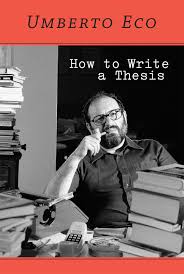Umberto Eco on What Literature to Read When Beginning Research?
 It is sometimes a daunting task knowing where to begin when researching a topic. Do you begin with primary texts? Do you begin with secondary texts? It really is both. Umberto Eco, helpfully, identifies the push and pull of such process. It is a dance between the primary and secondary, back to the primary, only to be reacquainted with the secondary.
Below, Eco offers his voice on this process. I would add, when reading reading the secondary critical texts in the beginning of the process, make sure one or two of them is a newer volume so as to observe more up-to-date bibliography and note the history of research.
It is sometimes a daunting task knowing where to begin when researching a topic. Do you begin with primary texts? Do you begin with secondary texts? It really is both. Umberto Eco, helpfully, identifies the push and pull of such process. It is a dance between the primary and secondary, back to the primary, only to be reacquainted with the secondary.
Below, Eco offers his voice on this process. I would add, when reading reading the secondary critical texts in the beginning of the process, make sure one or two of them is a newer volume so as to observe more up-to-date bibliography and note the history of research.
It seems to me the most sensible answer is this: approach two or three of the most general critical texts immediately, just to get an idea of the background against which your author moves. Then approach the original author directly, and always try to understand exactly what he says. Afterward, explore the rest of the critical literature. Finally, return to examine the author in the light of the newly acquired ideas. But this advice is quite abstract. In reality, students tend to follow the rhythm of their desire, and often there is nothing wrong with consuming texts in a disorderly way. The student can meander, alternating his objectives, provided that a thick web of personal notes, possibly in the form of index cards, keeps track of these "adventurous" wanderings.
Umberto Eco, How to Write a Thesis, trans. Caterina Farina and Geoff Farina (Cambridge, MA: MIT Press, 2015), 104.



